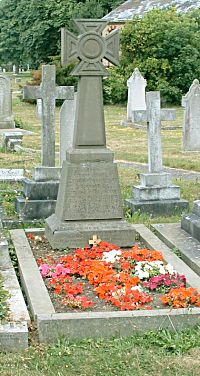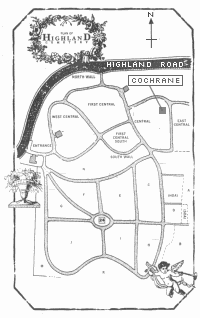

Location of Grave:
Highland Road Cemetery (See map)
HUGH STEWART COCHRANE V.C.
COLONEL
86th REGIMENT (LATER ROYAL IRISH RIFLES).
MEDAL WON: INDIAN MUTINY 1 APRIL 1858.
GAZETTED: 24 DECEMBER 1858.
BORN: FORT WILLIAM 4 AUGUST 1829.
DIED: SOUTHSEA 23 APRIL 1884.
MEDAL: HELD BY THE FAMILY.
Details of the Award
On 1 April 1858 near Jhansi, India, when No. 1 company of the regiment was ordered to take a
gun, Lieutenant Cochrane dashed forward at a gallop under heavy musketry and artillery fire,
drove the enemy from the gun and kept possession of it until the company came up. He also
showed conspicuous gallantry in attacking the rear guard of the enemy when he had three
horses in succession shot under him.
Military Career
On 13th April 1849 Hugh Cochrane was commissioned Ensign in the 86th (The Royal County Down) Regiment of Foot. He saw service in Deeja and Poonah in Bombay and on 15th October 1852 was promoted to Lieutenant: Adjutant of the 86th Regiment. In 1855 he was serving at Kurrachee, Bombay under Sir Hugh Rose and was at the storming and capture of the hill fort at Chandairee (he was slightly wounded). He was present at the battle of Betwa: siege, storm and capture of the city and fortress of Jhansi, where under tremendous fire from the fort, he planted the British flag on top of the Palace.
On the 23rd April 1858 he was Mentioned-in-Despatches of Major-General Sir Hugh Rose GCB and the next month was present at the battle and capture of Koonch and various actions before Calpee and the battle before and capture of the city and fortress of Gwailor. He commanded Irregular Cavalry under Sir Robert Napier and by the end of the Indian Mutiny he had been Mentioned-in-Despatches twice, won the Victoria Cross and received the Mutiny Medal and clasp.
On the 24th August 1858 he attained the rank of Captain and transferred to 16th (Bedfordshire) Regiment at Dublin and the following year to the 7th Regiment, the Royal Fusiliers and saw service in Peshawur, Ferozepore and Bombay. From 1863 he served as a Major of Brigade with the Eusofzye Force during the North-West Frontier War for which he was awarded the medal and clasp. By 28th October 1871 Cochrane was a full Major and returned to England with 2nd Battalion, 7th Regiment at Portland, Dorset. In 1873 he was serving in Cork, Ireland but the following year he was back in India as Brevet Lieutenant-Colonel at Poona, and Bombay. He transferred to the 43rd (Monmouthshire) Light infantry with whom he served at Belgaum, Bombay. In January 1879 he was promoted to Colonel and stayed with the 43rd, through it's transition to the Oxfordshire Light Infantry until 1882 when he retired with the rank of Colonel.
Family History
Hugh Cochrane was born on 4th August 1829 at Kilmallie, Fort William, Argyll, Scotland. His father was George Cochrane and his mother Susan Cochrane (nee McColl). Nothing is known about his early life. On 23rd August 1865 he married Amy Bell, aged 20 at St George's, Hanover Square, London (the records are a little confusing in that her name could have been Ann Bell). There is no further information about her at present (apart from the fact that in the 1871 Census she is listed as living with Cochrane at Avoca Lodge, Freestone Rd., Southsea), but it is known that Hugh married for a second time to Mary Arden, 2nd daughter of Surgeon-General G.G. Maitland of Bath, but the date is not known. In the 1881 Census Hugh is recorded as living with Mary at Oriel House, Gloucester Road, Swainswick, Somerset with his Sister-in-Law Mary Maitland and three domestic servants. There is no record of any children born to either marriage. Cochrane is recorded as having died on 18th April 1884 at Villiers Road, Southsea, aged 55.

